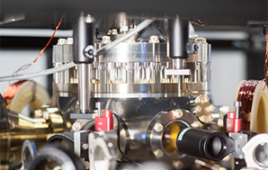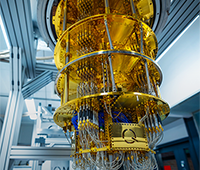
Institut Curie and Intel initiate a pioneering collaboration to develop, use and implement innovative bioinformatics tools, pipelines and techniques to improve the use of molecular profiling across both research and clinical oncology settings.
On Wednesday, Intel CEO Brian Krzanich met with French Président Emmanuel Macron during the Tech For Good Summit in Paris. Deeply conscious of what technology and artificial intelligence (AI) can do for the economy and society and with an unprecedented assembly of tech leaders from across the globe, the summit aims to establish the world’s foremost venue for frank and open conversations about technology’s central role in the modern world. The summit was the opportunity for Krzanich to discuss the new collaboration with the French Institut Curie around use of artificial intelligence to provide personalized cancer treatment.
Precision medicine for cancer requires the delivery of individually adapted medical care based on the genetic characteristics of each patient. The last decade witnessed the development of high-throughput technologies such as next-generation sequencing, which paved their way in the field of oncology. While the cost of these technologies decreases, we are facing an exponential increase in the amount of data produced. In order to open access to precision medicine-based therapies to more patients, healthcare providers have to rationalize both their data production and utilization. This requires the implementation of cutting-edge technologies: high-performance computing and artificial intelligence (AI).
Before making a therapeutic decision based on the genome interpretation of a cancer, the physician can be presented with an overwhelming number of gene variants. In order to identify key actionable variants that can be targeted by treatments, the physician needs tools to sift through this large volume of variants. While the use of AI in genome interpretation is still nascent, it is growing rapidly, acting as a filter to dramatically reduce the number of variants and providing invaluable help to physicians. The mastering of high-performance computing methods on modern hardware infrastructures is becoming a key factor in the cancer genome interpretation process while being efficient, cost-effective and adjustable over time.
The pioneer collaboration initiated between the Curie Institute Bioinformatics platform and Intel aims at answering those challenges by defining a leading model in France and Europe. This collaboration will grant Institut Curie access to Intel experts for defining high-performance computing and artificial intelligence infrastructure and ensuring its optimization in order to implement the Intel Genomics ecosystem partner solutions and best practices, for example the Broad Institute for Cancer Genomics pipeline optimization. Also anticipated is the development of additional tailored tools needed to integrate and analyze heterogeneous biomedical data. The collaboration will implement Intel® Select Solutions for Genomics Analytics based on Intel® Xeon® Scalable processors and Intel® Omni-Path Architecture.
“Artificial intelligence holds great promise for medical progress including genomics,” said Brian Krzanich, Intel CEO. “The Intel-Institut Curie collaboration is one more example of Intel’s commitment to the development of bold artificial intelligence research for the good of humanity.”
“Collaborating with Intel, Institut Curie will develop, use and implement Innovative Bioinformatics technologies to improve time to diagnosis, diagnostic accuracy, targeted treatment recommendations, and provide a better understanding of application needs to develop features that are needed for the healthcare sector,” said Emmanuel Barillot, head of the Institut Curie Bioinformatics platform and director of the Bioinformatics, Biostatistics, Epidemiology and Computational Systems Research Unit (U900, Institut Curie /INSERM/ Mines Paris Tech).
Amaury Martin, lead of Institut Curie Technology Transfer and Industrial Partnerships Office and director of the Institut Carnot Curie Cancer said, “This agreement with Intel, the world leader in the sector, marks a major step in the collaboration between Institut Curie and companies. It is a mark of recognition for the Institut Curie in the field of genetics, bioinformatics and precision medicine, and its unique model ranging from basic research to care. This agreement is undeniably an additional asset for the success of the Paris region platform SeqOIA co-founded between the APHP, Gustave-Roussy and Institut Curie within the framework of the France Medicine Genomic 2025 Plan.”



